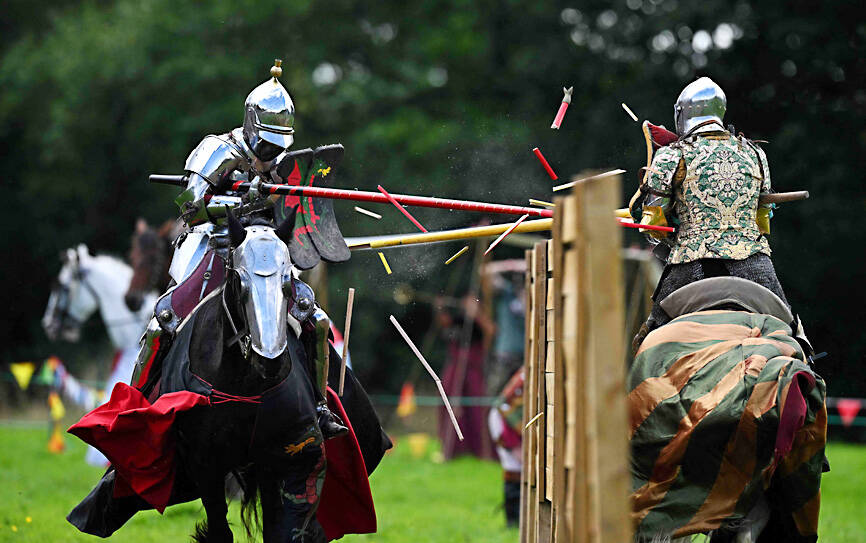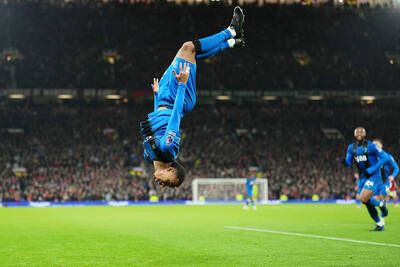At an 11th-century castle off the coast of southern England, two knights in suits of shining armor charge at each other on horseback at top speed, wooden lances at the ready. To the beat of drums and the thundering of hooves, the weapons make contact and one of them splinters into pieces, sending up cheers from the watching crowd.
The jousting tournament at Carisbrooke Castle on the Isle of Wight recreates what was once a common sight across the England of the Middle Ages.
What has been described as “England’s first national sport” is far from being a genteel re-enactment.

Photo: AFP
“We aim at each other’s heads,” said Clive Hart, who works as a data engineering manager when he is not jousting. “You don’t get that in most other types of sport ... so there’s an extra element of risk that people I think appreciate and certainly find exciting.”
Jousting is one of the oldest equestrian sports in the world and in England dates back to the 10th century.
It used to be a form of military training for knights — the heavily armed mounted soldiers of medieval Europe — to practice between battles.
Proponents need finely honed skill and horsemanship — and a strong nerve, even though using deadly pointed weapons are a thing of the past.
Modern-day tournaments are mostly held at historic castles and on the grounds of stately homes, with knights trying to score points rather than unseat their opponents.
Its revival, after dying out by the early 17th century, has even seen calls for it to be made an Olympic sport.
“The modern jouster possesses many of the same skills” as an Olympic athlete, says English Heritage, which manages historic monuments, buildings and sites.
“Perhaps it’s time that this extraordinary display of speed, power and courage appears on the greatest sporting stage in the world,” it said.
The battles are held mostly during the warmer summer months and draw crowds of fans eager to cheer on the modern-day counterparts of the bold knights of old.
“It’s very exciting, fast-paced action,” lawyer Paul Abdey said, watching in the crowd. “You can tell they are really doing it, as opposed to being scripted, so yes, really enjoyed it.”
“It is really competitive,” added Rob Eston, a teacher. “When you see them doing it, it takes a lot of skill. It’s really good to come along and support and keep these things alive because it’s our history.”
Dominic Sewell, who has had a lifelong fascination with knights and war horses, is one of Britain’s best-known competitors and an expert in the sport.
A hastilude veteran of more than 20 years, who has competed at the World Jousting Championship, he also trains others in the sport at his stables.
“It’s physically demanding to wear 30kg of armor on the back of a horse moving at 20 to 25 miles per hour [32kph to 40kph] and then accepting an impact from somebody else moving at the same speed with the same equipment,” he said. “It’s very demanding doing it day after day after day. It can be very draining, as in any sport. It’s not pretend.”
Modern-day jousters base their equipment on what was traditionally used — but participation comes at a price, reflecting its elitist roots as the sport popular with kings, queens and the nobility.
A suit of armor today costs more than US$21,000.
One modern change has been the sport opening to women such as Lisa Dixon, who said it was an equal playing field.
“There’s no feeling quite like it, being able to get onto these venues ... knowing that at some point, somewhere around that venue, people did joust on there and you are literally following in their hoofprints,” she said. “I’ve always said it’s a very, very special feeling to be recreating history.”

The pressure was already on Real Madrid coach Xabi Alonso before their 2-1 defeat to Manchester City on Wednesday in the UEFA Champions League raised further questions about his future. Arsenal remain perfect in this season’s competition and three points clear at the top of the standings after a 3-0 win against Club Brugge, while defending champions Paris Saint-Germain were held 0-0 at Athletic Bilbao. The clash between Madrid and City was the standout game of the round amid reports this week that Alonso had lost control of the locker room. Speculation over his position is likely to intensify after the latest

By the time Cameron Menzies finally left the arena on Monday, the blood gushing from the gash on his right hand had trickled down his wrist, part of his forearm and — somehow — up to his face. Smeared in crimson and regret, and already mouthing sheepish apologies to the crowd, he disappeared down the steps, pursued by a stern-looking Matt Porter, the chief executive of Professional Darts Corp (PDC). The physical scars from Menzies’ encounter with the Alexandra Palace drinks table after his 3-2 defeat against Charlie Manby at the Darts World Championship would be gone within a few weeks.

Manchester United on Monday blew the lead three times to miss out on moving up to fifth in the Premier League as AFC Bournemouth would not be beaten in a thrilling 4-4 draw at Old Trafford. United have lost just once in their past 10 games, but Ruben Amorim would be frustrated as more points at home were frittered away despite arguably the best attacking display of his reign in charge. Amad Diallo and Casemiro gave the hosts a halftime lead either side of Antoine Semenyo’s equalizer. Two Bournemouth goals from Evanilson and Marcus Tavernier in seven minutes at the start of the

‘HIGH STANDARD’: The Thunder are on track for a Finals-Cup double after they scored 22 three-pointers in equaling the best 25-game start to a season in NBA history The Oklahoma City Thunder on Wednesday bagged a 16th straight victory, thrashing the Phoenix Suns 138-89 to romp into an NBA Cup semi-final clash with the San Antonio Spurs, who stunned the Los Angeles Lakers 132-119. NBA Most Valuable Player Shai Gilgeous-Alexander scored 28 points to lead the reigning NBA champions Thunder, who improved to 24-1 to equal the best 25-game start to a season in league history. They dominated from start to finish to book their place in the final four of the in-season tournament in Las Vegas, where they are tomorrow to take on the Spurs. The New York Knicks and